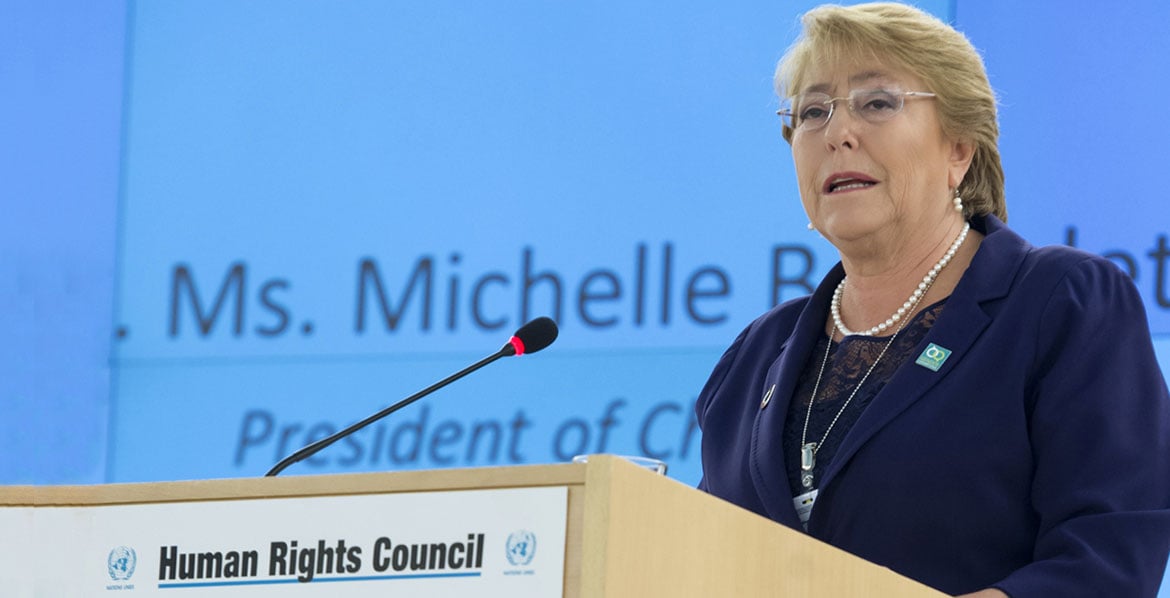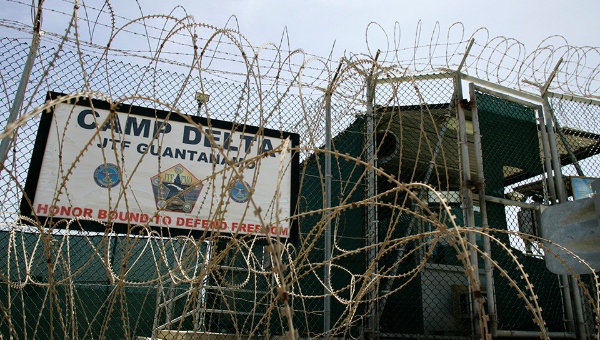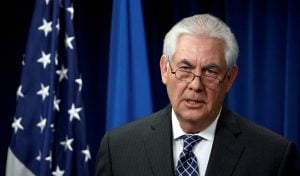Human Rights, China vs. the U.S: Wars, Sanctions, Violation of Civil and Political Rights.
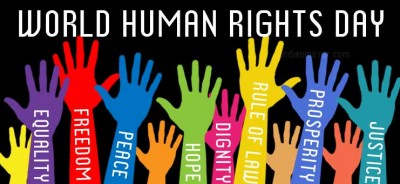
All Global Research articles can be read in 51 languages by activating the “Translate Website” drop down menu on the top banner of our home page (Desktop version).
To receive Global Research’s Daily Newsletter (selected articles), click here.
Visit and follow us on Instagram at @globalresearch_crg.
***
Introduction
If there is one thing which will never leave the human world, it is the violation of human rights.
The phenomenon of human rights violation is essentially the process in which the strong exploits the weak and the rich looks down on the poor. And, there will always the strong and the weak; there will be always rich and the poor. Human rights violation may be an integral part of humanity; it is the major shame of humanity.
No country is free from this dark side of humanity. The violation of human rights transcend the political regime and the state of economic development.
Nonetheless, well-intended people have established numerous institutions and programs to fight human rights violation, but they have proved to be less than efficient or effective.
Moreover, what makes us sad is the reality in which human rights are used as a weapon for political purposes and world domination.
This paper discusses three issues and offers some suggestions to improve the protection of human rights.
First, it will discuss whether or not American wars and economic sanctions violate human rights.
Second, it will examine the violation of civil and political rights in the U.S. and China.
Third, it will focus on the use of human rights violation as a weapon of diplomacy.
Fourth, in the conclusion section, some suggestions are offered to improve the human rights protection.
American Wars, Economic Sanctions and Human Rights Violation
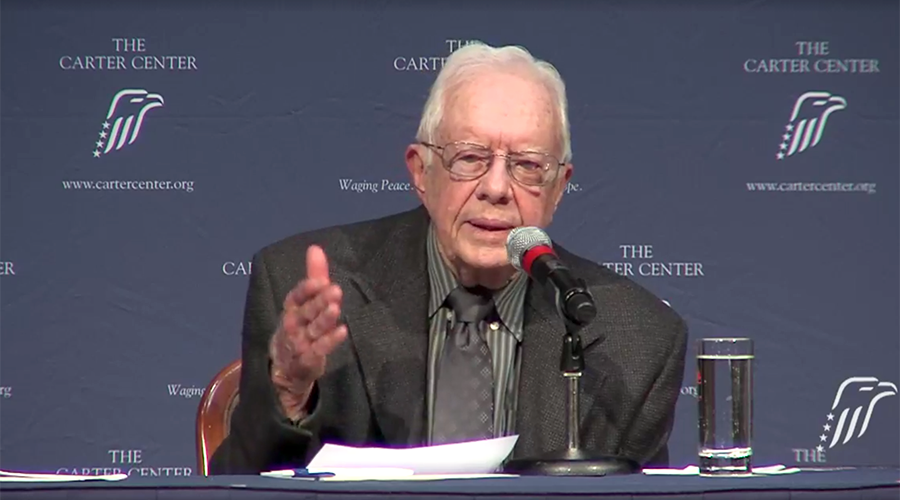 Former President Jimmy Carter is quoted to have said this:
Former President Jimmy Carter is quoted to have said this:
“The US had only 6 years of peace in 242-year history making the country the most warlike country of the world.”
Human Rights and Acts of War
Most of the recent American wars including the wars against Iraq, Afghanistan, Syria and other countries were unauthorized either by the UN or by the US Congress. According to CGTN News (2021.04.09.) in the period, 1945-2001, there were 153 armed conflicts of which 81% was initiated by the U.S.
The most important human right is the right to physical survival of the person. The right to freedom does not mean much for the dead person or those who have lost the means to survive physically (refugees) due to the war.
So can we say that wars violate human rights?
War kills people; it takes away the right to live. In Afghanistan, a great number of people were detained by American intelligence agencies including CIA without evidence and without lawyer. Some years ago, the Human Rights Watch produced 59-page report on human rights violation by Americans. In the report, we read:
“The Bush administration was setting the terrible precedent to the rest of the world by the practice of arbitrary arrests, detention and mistreatment of detainees.”
The Human Rights Now (HUN) urged the United Nations Human Rights Council to conduct impartial investigation by an independent inquiry of the UN on human rights violation in Iraq that happened during the invasion and occupation by the coalition forces led by the U.S.
The crimes committed by allied forces led by American forces include direct killing of civilians, the use of phosphorous weapons, the denial of victims to hospital, the use of uranium weapons, the abusive treatment of detainees by Americans in a prison in Abu Ghraib, physical abuse by torture and other mistreatments. The world does not forget the U.S. crime of pardoning three war criminals who shot civilians and executed captured Iraqis.
According the 2019 estimate by the School of Watson Institute for International and Pacific Affairs at Brown University, the cost of these wars is $6.4 trillion and 801,000 deaths.
The human rights violation by the U.S. in Syria was described by the political and medical advisor to President Bashar al-Assad as follows: :
“We condemn the US violation of Syrian People’s human rights and we condemn the US killing Syrians and plundering of Syrian resources. The US presence in Syria is a naked aggression.”
Thus, there is no doubt that the wars initiated by the U.S. are accompanied by vastly serious violation of human rights of the people of the target countries.
The following table shows the victims of the three wars initiated by the U.S.
Table: Victims of the Three Wars
These three wars killed 280,000 civilians and produced no less than 20,000,000 refugees.
The sanctions could be the most serious inhumane violation of human rights. In fact, one of the difficult questions to answer, in connection with human rights violation, is about the impact of sanctions on human rights. Up to now, it has been a common assumption that the sanctions are designed to fight against human rights violation in the target country and change the regime. But, it is becoming clear that the sanctions seldom succeed. Instead, sanctions make the civilians and the children starve to die. Sanctions are human rights violators.
A study commissioned by the UN concluded this:
“The amount of information available today on the devastating economic, social and humanitarian impact of sanctions no longer permits to entertain the notion of unintended effects.”
This observation denies the sanction imposer’s common argument that civilian casualties of sanctions are unintended effects.
A member of the UN Social Council stated:
“There can be no doubt that the civilian population in targeted countries are victims of human right violation.”
An independent expert appointed by the Office of High Commissioner for Human Rights of the UN is deeply concerned with the recent imposition of unilateral coercive measures on Cuba, Venezuela and Iran by the United States said this:
“The use of economic sanctions for political purpose violates human rights and norms of international behaviour. Such actions precipitate man-made humanitarian catastrophe of unprecedented proportion.”
“Regime Change through economic measures is likely to lead to the denial of basic human rights and indeed possibly to starvation…”
An expert in public health of the National Center for Biotechnology Information (NCBI) declared this:
“There can be no doubt that civilian population of the targeted countries are victims of human right violation.”
In the UN Website (2019.11.07.), we see that the UN General Assembly adopted a resolution asking to stop sanctions against Cuba. According to the UN Website (2019.08.08.), the UNHR High Commissioner Michelle Bachelet pointed out that sanctions against Venezuela have implication on human rights.
The global opinion which is growing is the fact that economic sanctions invite serious violation of human rights. Furthermore, sanctions seldom succeed in attaining their objectives. The expert of the NCBI observes this about the effectiveness of sanctions:
“A State imposing sanctions on its opponent can expect an outcome that is just about the same as would be obtained without sanctions.”
We do not know exactly how many poor countries have been prey of American economic sanctions. But, as of October 2021, 39 countries had been the targets of 8,000 American sanction measures. It seems clear that the U.S. is a major human rights violator.
True, it is difficult to quantify the impact of US wars and American sanctions on the human rights of people of the numerous countries which have been the target of American invasion and sanctions. But, given the sheer number of people who have lost their life and who almost their lost lives, the violation of human rights of these poor people is beyond our imagination.
There are three types of human rights: the civil and political rights, the economic, social and cultural rights and the collective rights. The first type refers to freedom, while the second type refers to the right to life. The third type is related to the right of specific groups such as Native Americans.
We know that war and economic sanctions violate human rights. But which type of human rights do they violate? I am afraid that the wars and economic sanctions violate all the three types of human rights.
The wars and sanctions kill people. A dead person loses all the three types of rights. A dead person has no longer the right to the freedom of speech; a dead person has no longer the right to life; a dead person has no longer the collective rights.
The wars and sanctions produce refugees who lose the right to the means to survive in the short run and even in the long run.
The wars and sanctions destroy the country’s means of production of goods and services leading to economic decline, which threatens people’s right to survive in the long run.
In short, the wars and economic sanctions violate total human rights.
Violation of the Civil and Political Rights in China and the U.S.
The following human rights violations are examined: mass killing, arbitrary detention, freedom of expression, repression of human rights defenders, freedom of assembly, freedom of the press, religious freedom and human rights violation in Xinjiang.
In China, two major killing events are known.
- In 1989, Tiananmen Square Protests resulted in several hundred deaths and several thousand injured people,
- In the period of 1995-2016, in Xinjiang there were 155 incidence of violence, resulting in 740 killed and 768 injured.
- In 2013 alone, there were 3 incidences of violence killing 45 people;
- in 2014 alone, there were 3 incidences of violence killing 83 persons and injuring 169 people. Most of these victims were the results of terrorists attacks.
In the U.S., in 2020, 1,000 were killed by the police. There are 415 incidences of mass killing a year, or more than one incidence a day. In 2019, 39,052 gun related death occurred, one person killed by gun every 15 minutes.
Arbitrary Detention
In China, there are some reported cases of arbitrary detention. There could be more.
- In June, 2020, the EU demanded the release of Yu Wensheng who was detained for two years in prison for inciting subversion against the State
- In Xinjiang, in 2017, according reports, one million Uyghurs, Kajakhs and other Muslim people were detained for indoctrination and cultural assimilation at education centers
- In June 30, 2020, in Hong Kong, the National Security Law was passed
In the U.S., there are no published data on arbitrary detention of American citizens, but in the naval base in Guantanamo Bay, Cuba, there were many persons who were the target of arbitrary detention.
According to a UN Human Rights Report entitled “Guantanamo Bay: “Ugly chapter of unrelenting human rights violations”:
“Twenty years of practising arbitrary detention without trial accompanied by torture or ill treatment is simply unacceptable for any government, particularly a government which has a stated claim to protecting human rights,” said the independent experts, appointed by the Human Rights Council.
“As a newly elected Member of the Human Rights Council, the experts again call on the United States to close this facility and close this ugly chapter of unrelenting human rights violations.”
In 2003, the facility was holding 700 prisoners. Twenty years later, 39 detainees remain but only nine of them have been charged with or convicted of crimes, 13 have been cleared for transfer. Between 2002 and 2021 nine detainees died in custody, two from natural causes and seven reportedly committed suicide. None had been charged or convicted of a crime.
Freedom of Expression
In this paper, the freedom of expression is distinguished from freedom of the press. The former refers to the public gathering in order to express opinion on matters of public interests, while the latter refers to media reporters’ freedom of reporting.
In China, the freedom of expression is restricted. The following is the list of reported cases. However, it is interesting to point out that these restrictions have increased during the pandemic.
- On 2020.07.29, the government began to apply the New National Security Law designed to control free speech and academic freedom.
- On 2020.08.11, Human Rights Watch asked authorities to release ten democracy supporters who were arrested in August, 2020.
- In June 2020, Cai Xia, retired professor of the CCP’s Central Party School, called Xi Jinping as “mafia boss” and called CCP as political zombie. She was expelled from the school.
- Li Wenliang, a Chinese medical doctor who worked at Wuhan Central Hospital, issued warning to colleagues at other hospitals. He was arrested for making false comments.
- Fang Bin, a Chinese businessman who did broadcast on the Wuhan situation, disappeared since February 2020.
- Chen Qiushi, Chinese lawyer and active citizen journalist, covered the Hong Kong protests and COVID-19 disappeared since 2020.02.06.
- Li Zehua, Chinese citizen journalist and Youtuber, tried to trace lawyer-citizen journalist missing since 2020.04.10. with no success.
- Dr. Li Mengyen, virologist and whistleblower, had to escape to the US after she found a large scale cover up of pandemic situation created by the Chinese authorities.
- Zhang Zhan, independent journalist, served 4-year prison terms for “picking quarrels” and provoking troubles by going to Wuhan to learn about the situation.
- In November 1992, 192 Chinese activists submitted a petition to the 16th National Congress of CCP for the reform of the Chinese authority. Zhao Changging, one of the activists, was arrested.
In the US, freedom of expression is allowed.
Before we go any further, it seems relevant to examine the Chinese policy of the freedom of expression.
The basic philosophy of China’s policy is the importance of harmonizing the right of free expression with Chinese values. For Lee Kuan Yew, former president of Singapore and reputed defender of Asian values, argued for the adaptation of human rights to national and cultural conditions. This is in fact enshrined in the Chinese constitution. Here are the relevant articles.
- Article 35: freedom of speech, press, assembly association are guaranteed
- Article 53: citizens must obey laws and respect social ethics
- Article 54:The above mentioned right should not conflict with interests of the State
China believes that freedom of expression has universal values but its application should be contextualized.
“It is the idea and common need that give rise to universal whilst the implementation of the right in a given context is that which produces the particular. The two concepts must be respected equally in order not to betray either the universality or particularity of human rights.” (P.H. Sun. Human Rights Protection System in China, 20014)
Repression of Human Right Defenders
China restricts human right activities, while in the U.S. such restrictions are not reported.
- In June 2020 in China, a legal scholar Xi Zhiyong and Ding Jiaxi were arrested for inciting subversion of state power.
- In February 2020, Hong Kong bookkeeper Gui Minhai was sentenced to 10-year imprisonment for illegally providing intelligence information to foreign entities.
- In September 2020, Chen Yuan and two others were in the state incommunicado for their anti-discrimination activities.
- Yang Hengjiun, Australian writer, has been incommunicado since December 12, 2019.
- In June 17, Yu Wensheng, human rights activist, was convicted for 4-year imprisonment.
- On August 10, 2020, Jimmy Lai, owner of pro-democratic newspaper Apple Daily in Hong Kong, was arrested for collusion with foreign extreme groups.
Freedom of Assembly
In China, the only reported case of preventing public assembly was the 1989 Tiananmen Square protest resulting [according to Western sources] in 300 civilian deaths in addition to 5,000 soldiers and 2,000 civilians wounded.
During the Summer Olympics of 2018, assembly was restricted in designated places. Public gatherings were forbidden.
In the US, the following cases have been reported.
- In May-June 2020, there were 125 incidents of police violence against protesters in 40 states.
- According to the CNN Report (2019.08.11), 100 protesters were arrested.
- According to the Houston Chronicle Website, 15 protesters were arrested.
- We find in the Miami Herald Website (2019.11.29) that 40 protesters arrested.
Freedom of the Press

In China, many cases of the restriction of press freedom have been reported.
- In 2008, ITV News reporter, John Ray was arrested while covering the Tibet protest.
- In March 2020, the Chinese government expelled employees of New York Times, the Washington Post, the Wall Street Journal in protest to US treatment of state-owned Chinese media employees in the U.S.
- Ursula Gauthier, French journalist working for l’Obs, was sent home for reporting on China’s treatment of Uyghurs and vocational training at vocational training center where alleged torture, sexual abuse, non-payment for works took place.
- In 2015, China expelled Melissa Chan from Al Jazeera for reporting “black jails” and government’s land confiscation.
- Reporter without Borders (RSF) says that “China is the world’s biggest prison of ‘Netizens’.”
- In 2010, Tan Juran was arrested and sentenced 5-year prison for reporting corruption and poor school construction leading to deaths of thousands of children during the earthquake in Sichuan. He got 4-year imprisonment.
- Shi Tao was sentenced with 8-year imprisonment for reporting the list of instructions which the state sent to journalists regarding how to report the 15th anniversary of the Tiananmen Square massacre.
- Chen Lei, Australian TV host, was arrested due to Australia-China tension over the COVID-19 investigation.
The U.S. is not free from the guilt of restricting freedom of the press.
- As of 2020, 28 journalists were attacked during public protests.
- On 2019.08.11, during the protests against the Immigration and Custom Enforcement, 100 protesters were arrested.
- According to the US Press Freedom Tracker (2019.08.18), there were 28 incidents in which journalists were denied access to government events; 9 journalists were charged with criminal offence.
- In 2017, 54 journalists were subpoenaed or their records seized; 36 journalists were arrested while covering protests in the US.
- In the Guardian Website, we find that the US Administration is mounting the most direct attack on press freedom in American history.
- According to the Dallas Morning News (2019.12.06), Texas is the secretive surveillance Center for better intelligence for the three levels of government; it has 64.5 million photos.
Religious Freedom
In China, the state protects normal practice of religion. But, there are restrictions.
“No one may make use of religion to engage in activities that disrupt public order, impair health of citizens or interfere with the educational system of the State. Religious bodies and religious affairs are not subject to any foreign domination.”
The following shows some aspects of China’s policy on religions:
- The members of the Chinese Communist Party (CCP) should be atheists.
- The government allows some Christian groups which are Three-Self Patriotic Movement and the Chinese Patriotic Catholic Association.
- House-church is illegal. But according to a Protestant church in Korea I know of, it is possible to minister family churches that are quite numerous.
- In 2017, the Chinese patriotic Catholic Association elected the bishop of Beijing but the Pope did not recognize him.
- Regarding Buddhism, according to Regulation of 2007.08.03, no living God may be reincarnated without the government approval.
- The government appointed Pachen Lama which is fake in the eyes of those who regard this as PRC effort to control organized religion.
- There is a quota on the number of monks to reduce the number of spiritual population.
- Non-patriotic monks are expelled.
- Monks are forced to recite patriotic scripts.
- Religious education cannot be done before the age of 18.
Human Rights Violations in Xinjiang
The Xinjiang region presents one of the major difficulties for China. It is a region which has been the constant threat to the stability of the Chinese society due to value gaps between the Uyghurs and the Hans. Moreover, there is evidence of the presence of Islamist terrorist organization supported by foreign powers within Xinjian-Uyghur (see our analysis below).
Xinjiang poses a constant threat of independence by the Uyghurs who are, in majority, Muslims.
We see below some the elements of China’s Xinjiang policy, largely based on Western sources which often present a biased perspective:
- Article 36 of the constitution protects the religion of all citizens.
- But since Xi Jinping took over the power in 2012, the Uyghurs Autonomous Region is subject of the state control for the practice of Islam.
- Religious practice is allowed only in state-approved mosques.
- Uyghurs under 18 are not allowed to enter the mosques.
- Education of religion is allowed only at the designated schools.
- Women are not allowed to wear headscarves and veils.
- Men are not allowed to have beards.
- The use of Islamic name is forbidden.
- In 2012, 1 million Muslims were detained in internment camps with no trial or lawyers. They were re-educated to renounce Islamic belief.
- According to the Radio Free Asia, in 2018, an Uyghur man, Abduheber Ahmet sent his son to a school which is not approved by the State. Ahmet was sentenced to 5-year imprisonment.
- In 2018, 1 million Chinese workers were forced to live in the homes of Uyghur families to monitor assimilation.
- Thousands of children were separated.
- Number of children living in boarding housing rose to 880,000.
- According to the Forced Labour Report of Australian Strategic Policy Institute(ASPI), in 2021, an Uyghur woman in internment camps told about the violence, sexual abuse, torture, and rape.
- No less than 80,000 Uyghur people were sent to forced labour in factories such as Fitch, Adidas, Amazon, Apple, BMW, Nike, Samsung and several others.
- In February 1997 Yining county located between Kazakstan and Xinjiang, 12 independence leaders were executed; 27 others were arrested; 200 Uyghur people were killed; 2,000 Uyghurs were arrested.
- In July 2009, anti-Han program was committed in Ruriqi Xinjiang.
The West’s reactions are noteworthy. On 2020.07.19, British Foreign Secretary Dominic Raab accused PRC of “gross and egregious human rights abuse against Uyghurs.” On 2020.07.24, two members of European Parliament Hilde Vautmans and Katalin Cseh wrote a letter to European Commission to punish China for violation of human rights of Uyghurs. On 2020.07.28, the US government put pressure on global businesses to re-examine and cut ties with China.
On 2020.08.31, human rights campaigners requested the US authorities to ban the imports of cotton made by forced labour. On 2020.10.10, the UK shadow foreign secretary Lisa Nandy urged Britons to block Chinese seat in the UNHR Council. But China is in the Council. On 2021.01.19, Mike Pompeo, former Secretary of State, claimed without evidence that:
“China is committing genocide against the Uyghurs and crimes against humanity. I believe that genocide is ongoing, and that we are witnessing the systematic attempt to destroy Uyghurs by the Chinese party-state.”
Pompeo calls for “all multinational and relevant judicial bodies to join the United States in our efforts to promote accountability for those responsible for the atrocities.”
Before we demonize China, we should examine the rationale of China’s Xinjiang policy.
There are two basic reasons, namely,
- the need for cultural assimilation of the Uyghurs
- the fear of Islamic terrorism (linked to Al Qaeda) related to the independence movement.
Independence Movements
In China, as of 1964, there were 183 registered minority groups of which the government recognized 54. The independence movements have taken place in the following regions:
Xinjiang, Inner Mongolia, Ningxia, Tibet, Guangxi.
However, it is Xinjiang where the independence movement is the most radical and intense.
It is interesting to review the Chinese policy pertaining to ethnic minorities. Sun Yat-sen took over the destiny of China in 1912 and he was, in a way, the father of Chinese democracy. He sent Han people, the great majority of the Chinese population, from Southeast to Northwest China in order to assimilate minority groups into the Chinese value system.
Chiang Kai-shek succeeded Sun Yat-sen and adopted an education system for further assimilation of minority groups. For this, the ethnic minority groups were given preferential treatment for jobs, political appointment, business loans, university entrance quota.
However, under Mao Zedong, ethnic minorities enjoyed greater autonomy. For instance, Mongolia became independent in 1921; Xinjiang became autonomous in 1955. Mao’s policy may be explained by the fact that Mao attached greater importance to the value of international communism, thus, he might have felt the need to dilute traditional Chinese values.
On the other hand, Mao’s policy might have led to more cultural autonomy and, indeed, as well as movements towards political autonomy.
However, as it was pointed out above, it is in Xinjiang where the independence movement is the most radical and intense.
One of the most costly independence protest movement took place in 1997. In February that year, in Yining county, located between Kazakstan and Xinjiang, 12 independent leaders were executed; 27 others were arrested; 200 Uyghurs were killed; 2,000 Uyghurs were arrested.
The Xinjiang territory was incorporated into China in 1884. Since then, the independence movement has been a part of Xinjiang history. There are four major organized independence movements:
- The Eastern Turkistan Islamic Movement (ETIN),
- The East Turkistan Liberation Organization (ETLO),
- The United Revolutionary Front of East Turkistan (URFET)
- The Uyghurs Liberation Front (ULF).
The members of these organizations are trained in Central Asia, Pakistan and even Saudi Arabia. Every year, 5,000 Uyghurs pilgrims in Saudi Arabia get trained for terrorism and, on their return to Xinjiang, they play central role in Xinjiang independence movements.
Violence in Xinjiang and in some part of mainland China is almost a regular picture of collective life. In the period between 1989-2016, there were 268 incidences of violence, 1,033 violent deaths and 2,013 injured.
The detention of an alleged one million Uyghurs sounds harsh. What is China’s position? China seeks cultural and political assimilation of the Uyghurs into the Chinese values as well as the denial of the Turkestan Islamist movement.
The detention centers are reeducation facilities intended to reintegrate the Uyghurs into the mainstream of Chinese society.
According to an article by thediplomat.com of May 2021, Ma Ling, a Muslim teacher at one of the detention centers, said there were eight ethnic groups including Korean Chinese and after having learned Mandarin, they could find jobs. Ma Ling is quoted to have said this:
“Whether Uyghurs or other ethnic groups in Xinjiang, they are shocked and very angry when they hear the West saying there was genocide in Xinjiang.”
It appears that the more serious reason for harsh policies applied to Xinjiang is the genuine fear of terrorism. In 2019, the New York Times published a leaked document and quoted Xi Jinping saying this:
“East Turkistan terrorists who have received real war training in Syria and Afghanistan could anytime launch terrorist attack in Xinjiang.”
According to moderndiplomacy.eu of May 3, 2020, the CCP is aware of the link between the Uyghur separatists and Islamist militant organizations in the Middle East and Southeast Asia, in particular, the Philippines and Malaysia.
 There are also several thousand Uyghurs fighting alongside militants Islamist groups in the Middle East. Moreover, the possible covert operation of Western intelligence services to destabilize China is another source of fear on the part of China.
There are also several thousand Uyghurs fighting alongside militants Islamist groups in the Middle East. Moreover, the possible covert operation of Western intelligence services to destabilize China is another source of fear on the part of China.
As a matter of fact, in 2014, Xi Jinping established the Comprehensive Security Framework requiring the CCP to focus on the increased vulnerability to Jihadist infiltration.
The Chinese policy of Xinjiang is also based on the belief that the detention and re-education should psychologically and politically make the population resilient to Jihadists infiltration.
The Weaponization of Human Rights
Another major challenge of human rights is the use of human rights as a weapon of hegemonic war. The Sino-American conflict has been degenerated into unhealthy demonization of China on the basis of political human rights violation.
In order to use human rights violation as a weapon of diplomacy, high ranking bureaucrats make bold statement and sell the idea through friendly media. The statement of Tony Blinken, the State Secretary of the U.S. is a good example. He said this:
“Amid growing international condemnation, the PCR continues to commit genocide and crimes against humanity in Xinjiang. The United States reiterates call on PRC to bring an end to the repression of Uyghurs, who are predominantly Muslims, and number of other Muslim and religious minority held internment camps and detention capacities.”
In 2017, a US State Dept. memo confirmed that the US has a standby policy of using allegation of human rights violation as a bludgeon against countries like China while ignoring human rights violation against states of the empire like Egypt and Saudi Arabia.
Image below: Rex Tillerson
In 2017, Politico published an internet memo sent to Secretary of State Rex Tillerson by virulent neo-con Brian Hook. The memo reads:
“Human rights are really just a tool to be cynically exploited to advance the goal of planetary hegemony like old veteran explaining the back story to the new guy in pilot episode of a new TV show.”
“One realistic guideline for a realistic and successful foreign policy is that allies should be treated differently-and-better than adversaries. We do not look to bolster American adversaries. We look to pressure, compete with, and out-manoeuvre them. For this, we should consider human rights as an important issue in regard to the US relations with China, Russia, North Korea and Iran. And this is not only because of moral concern for practice in these countries. It is because pressing these regions on human rights is one way to impose costs, apply counter pressure, and regain initiative from them strategically.”
“It should be clear to you now. Neither Washington nor its vassal states harbour any interests of the Uyghurs of Xinjiang, they are using that narrative to impose cost, counter pressure and regain initiatives from them strategically.
These incredible statements make us to review the evolution of Washington’s diplomacy with China. From 1970 Kissinger’s Beijing visit and the normalization of bilateral diplomacy in 1979 to the rise of China in the 2000s, the human rights issue was not a problem. During this period, the China’s Xinjiang policy was not very different from its present policy. But, suddenly, human rights issue of Xinjiang has become the main feature of the Western media. This proves that the current demonization of China with human rights violation in Xinjiang is not a human rights issue; it is a part of strategy of China containment policy.
Conclusion
To conclude, I have tried to show that neither China nor the U.S. are free from the guilt of human rights violation.
It is not easy to say which of the two violates more human rights. But, when you consider the impact of American wars and sanctions imposed by Washington, the U.S. may be considered to be the worst human rights violator.
One thing is clear is that Washington is not “clean enough” to accuse China, North Korea or any other country of violating human rights.
Human rights violation has been an integral part of human life.
As it was pointed out above, human rights violation is essentially the process in which the strong exploits the weak; the rich despises the poor.
There are too many violators of human rights. Individual violates them; the business violates them; the governments violate them; the international institutions violate them. And, there are as many possible targets of human rights violations as there are stars in the night sky.
The so-called “international community” does not have the array of devoted individuals, institutions, governments and international organizations which are dedicated to prevent human rights violation.
True, there are numerous well-intended international conventions designed to fight human rights violations. But, there is no effective legal backing.
True, each country has institutions to protect human rights, but there are no strong laws to support them.
To make matters worse, even if there are carefully formulated laws, their application are often useless because of the corruption of the judicial and penal system.
While I am not terribly optimistic about the future of human rights, these are my suggestions:
- First, human rights should not be used as political weapon, which will surely put peace further away. Besides, the use of human rights as a political weapon is illegal and immoral.
- Second, there are two basic types of human rights: the civil and political rights which value freedom and the economic, social and cultural rights in which the right to life has priority. My suggestion is this. The economic, social and cultural rights should be regarded as important as the civil political righs, if not more important. This is so especially in the U.S. After all, the right to life is more important than the right to freedom of speech. A dead person cannot talk.
- Third, there should be more and better legal backing not only to national human rights protection systems in each and every country but also to international conventions on human rights.
- Fourth, the fight against human rights violations should be accompanied by the fight against the corruption culture which is main source of human rights violations
- Finally, the UN Human Right Council (UNHRC) should be more aggressive and bolder in denouncing human rights violators, whether they are individuals, businesses or governments.
Note to readers: Please click the share buttons above or below. Follow us on Instagram, @globalresearch_crg. Forward this article to your email lists. Crosspost on your blog site, internet forums. etc.
Dr. Joseph H. Chung is professor of Economics at Quebec University in Montreal (UQAM) and member of the Research Center on Integration and Globalization (CEIM) of UQAM. He is Research Associate of the Centre for Research on Globalization (CRG).
Featured image: Michele Bachelet, Presidente of Chile speaks during Special Session of the Human Rights Council. 29 March 2017.



